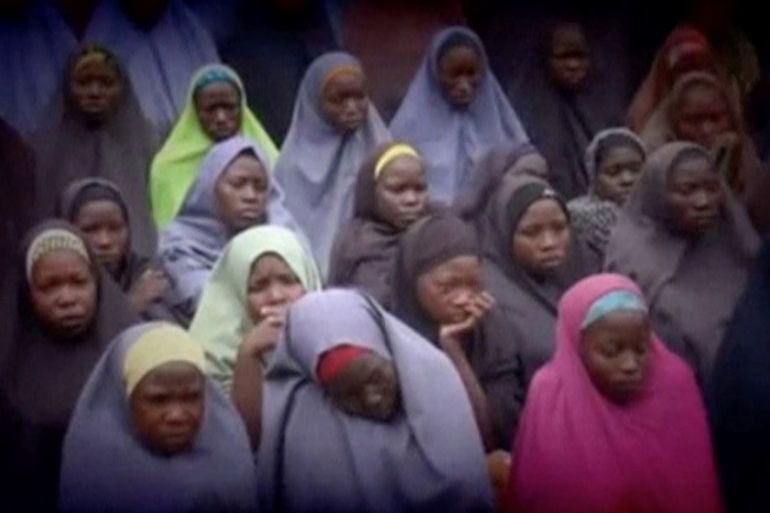Third of Chibok girls ‘unwilling to leave Boko Haram’
Over 100 Nigerian girls missing since 2014 could either be radicalised or ashamed to return, Chibok negotiator says.

Nigeria’s government is negotiating the release of another 83 of the Chibok schoolgirls taken in a mass abduction two-and-a-half years ago, but more than 100 others appear unwilling to leave their Boko Haram captors, a community leader said on Tuesday.
The unwilling girls may have been radicalised by Boko Haram or are ashamed to return home because they were forced to marry the fighters and have babies, chairman Pogu Bitrus of the Chibok Development Association told the Associated Press in a telephone interview.
Keep reading
list of 4 itemsMasked Tunisian police arrest prominent lawyer for media comments
Gaza’s mass graves: Is the truth being uncovered?
Tunisia: The migration trap
|
|
| Released Chibok girls in emotional family reunions |
Bitrus said the 21 Chibok girls freed last week in the first negotiated release between Nigeria’s government and Boko Haram should be educated abroad, because they will probably face stigma in Nigeria.
The girls and their parents were reunited on Sunday and are expected to meet Nigeria’s President Muhammadu Buhari this week, Bitrus said. Buhari flew to Germany on an official visit on the day of the girls’ release.
Buhari said on Monday that his government is prepared to talk with Boko Haram as long as the armed group agrees to involve organisations such as the International Committee of the Red Cross, which was an intermediary in last week’s release.
Some 276 schoolgirls were kidnapped from a school in northeastern Chibok in April 2014. Dozens escaped early on and at least half a dozen have died in captivity, according to the newly freed girls, Bitrus said.
All those who escaped on their own have left Chibok because, even though they were held only a few hours, they were labelled “Boko Haram wives” and taunted, he said. At least 20 of the girls are being educated in the United States.
Chibok is a small and conservative Christian enclave in mainly Muslim northern Nigeria, where many parents are involved in translating the Bible into local languages and belong to the Nigerian branch of the Elgin, Illinois-based Church of the Brethren.
Stigma of sexual abuse
“We would prefer that they are taken away from the community and this country because the stigmatisation is going to affect them for the rest of their lives,” Bitrus said. “Even someone believed to have been abused by Boko Haram would be seen in a bad light.”
One father of a newly freed girl, Emos Lawal, said his daughter was “praying that let the rest of them have the chance to come out”.
The freed girls have told their parents they were separated into two groups early on in their captivity, when Boko Haram commanders gave them the choice of joining the armed group and embracing Islam, or becoming their slaves, Bitrus said.
The girls freed and those whose release is being negotiated, numbering 104, are believed to be in the group that rejected Islam and Boko Haram, he explained. The freed girls said they never saw the other girls again.
Bitrus said the freed girls were used as domestic workers and porters but were not sexually abused.
He said that was why only one girl in the freed group is carrying a baby, and her parents have confirmed that she was pregnant when she was kidnapped.
An aid worker had told the Associated Press that he had seen the girls on their release and that all but three carried babies. Bitrus said that report was incorrect.
Previous negotiators in talks that failed also had corroborated that more than 100 of the girls did not want to return to their parents, Bitrus said.